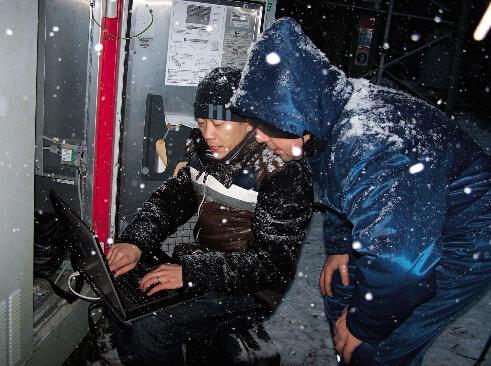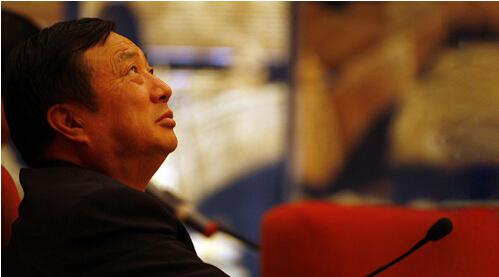Cisco announced a major layoff, although the number of layoffs is not as large as the previous million, but it also reached 5,500. In addition, Ericsson also reported that thousands of layoffs were reported last month. At one time, Huawei’s two major rivals seemed to be in deep crisis. Therefore, the theme of this issue of easy comment is that the world is Huawei?
Zuo Wei Ericsson right shock Cisco

About two years ago, when the media said that Huawei was the new Samsung, I think most people still sneered. Two years later, the people who eat melon suddenly discovered that Huawei not only successfully matched Samsung, but also completely defeated Ericsson and expelled Cisco. Huawei's product line shop is getting more and more open and there are some giant Samsung flavors.
However, in the past few decades, Cisco is still able to pinch Huawei's network equipment at any time. Ericsson is still a wireless device that Huawei is looking forward to. In 2004, if Cisco followed the path of Apple, holding a patent and Huawei to fight the world instead of reconciliation, there may be no Huazhi today. In 2012, there were 60 Cisco products on the government's procurement list, and in 2014 this figure plummeted to zero. In 2008, when Ericsson acquired Nortel, its revenue reached twice that of Huawei. In 2016, only the wireless market, Huawei has surpassed Ericsson. It is true that Huawei is successful, otherwise Ericsson and Cisco will not discuss the group.
However, this article is not intended to analyze Huawei's success as a national brand. And just want to say, even if Cisco Ericsson has fallen, the world is not Huawei. Yes, the crisis between Cisco and Ericsson is also Huawei's crisis. Hardware versatility is causing a major collapse in hardware vendors.
Huawei's crisis success does not stem from technology

There is no Huawei here is not a high-tech company. Huawei is not only behind Cisco or Ericsson in many places in technology, but also has many original technologies. The reason here is that Huawei's success at this level is not due to technical leadership, but to the world's number one technical support service.
The reason why Huawei is so arrogant has to say its strong and horrible technical support. Any problem with network equipment can't be avoided. However, in dealing with problems, if Cisco generally sends two engineers to solve the problem, Huawei can definitely send 20 past. Moreover, such customers generally have customization requirements for operators, but Cisco can only report such customers at the first level. However, Huawei can directly let product development go directly to the operator's computer room. This kind of quick response capability can't be done by any foreign company.
However, when it comes to technology leadership and scientific research environment, Huawei has inherent disadvantages. The growth rate of Internet bandwidth in these years is quite in line with Moore's Law. The reason is also very simple. The bandwidth capability depends on the switching capability of the core node, while the switching capability of the core node depends on the semiconductor technology, and China's semiconductor technology is far less beautiful than the old one. Cisco engineers are sitting in Silicon Valley and the most powerful Intel and Broadcom every day, and the future technological evolution path comes out.
However, such a sturdy Cisco has now reached the point where it has to change. The trend of hardware generalization has blurred the concept of network devices and servers. The popularity of cloud technology has led to the development of switching technologies in the direction of virtualization. The big defeat seems to be a foregone conclusion, or the environment of transformation or defeat has taken shape. Huawei is the leader of the network hardware industry chain in such a situation. A declining industry and a fast-growing company, Huawei actually looks beautiful and has a crisis inside.
Hardware company defeat
Dell's $67 billion acquisition of EMC, Alang and Nokia's share swaps all indicate that traditional hardware companies are deeply aware of their respective crisis and are starting to embrace the group. In the era of cloud computing or virtualization, hardware has become a universal product. Whether it is Cisco routers or Ericsson's wireless products, the form of unified hardware standards is becoming more and more obvious. Coupled with the rise of Chinese hardware manufacturers, the original low-end hardware market is extremely low-profit, and the collapse begins with foreign hardware manufacturers. Even the former Big Blue IBM had to share server technology with Inspur.
Have you found that hardware companies have cut a lot of staff in recent years, HP, Dell, IBM, EMC, Cisco and Ericsson. On the big list of layoffs, these companies are listed on the list. Some companies have also cut and cut. Even China, which was once less affected, has not been spared. There are too many hardware companies in the 1990s. And nowadays each is a giant, HP, Dell, IBM, EMC, Cisco and Ericsson and so on. Around the year 2000, the Internet was just emerging, and each company had its own main customer base due to the hardware's proprietary nature at the time. Each hardware configuration has its own characteristics. Take Cisco and IBM, each company must have a large number of technical support staff, because the IT department staff of the customer company can not make these annoying hardware configurations.
In the era of cloud computing, network routing components have been virtualized. The current concern is how to get the best network performance on general hardware. Whether it is DPDK or OpenvSwitch, the wave of software-defined networks not only breaks the barriers of hardware, but also reshapes the evolution of various network protocols. Take Intel's DPDK, the original software-defined network needs the support of the basic operating system kernel such as Linux, but now with the DPDK, the virtualized network formation can almost obtain the performance of proprietary network hardware such as Cisco. Although Cisco is also a lot of in the field of network virtualization, it is not the leader in the field of network virtualization.
Written at the end

Some people may say that Huawei has successfully transformed itself by relying on the consumer business. In fact, it is not the sale of mobile phones is not the hardware industry chain, Ericsson has not sold mobile phones. Apple also has strong software products such as iOS, but how does Huawei's mobile phone leave Android? And no matter how fast the terminal business grows, it is currently only a small boat in the Huawei fleet, and its revenue is less than one tenth of Huawei's total revenue. The red sea of ​​the smart machine market has made the business's profit margin extremely low. Huawei's high-speed growth still depends on the sales of routing and wireless devices. Today, Ericsson Cisco has been caught in the crisis brought about by the technological revolution as the leader of the 5G communication and routing era. Whether Huawei needs to be wary of the future will face the same fate.
The three kingdoms compete for hegemony, and Wei Wei Wu has three legs. Sixty years of war, just as Wei Guo Cao’s arrogance for the annihilation of Wu and Yang Yang, but unexpected Jiangshan has surnamed Sima. Huawei’s group of wolf roots has caused a pool of spring technology, but is it able to withstand the torrent of the times? When you are in peace, you will be prepared.
Brake Pressure Sensor,Pressure Detector Brake,Hydraulic Pressure Sensor,Analog Pressure Sensor
Shenzhen Ever-smart Sensor Technology Co., LTD , https://www.fluhandy.com